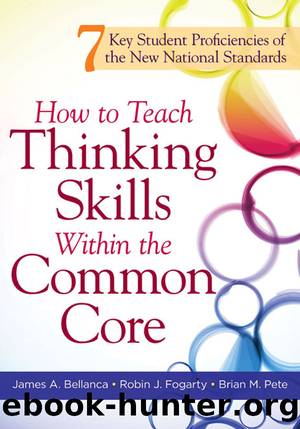How to Teach Thinking Skills Within the Common Core by James A. Bellanca & Robin J. Fogarty & Brian M. Pete

Author:James A. Bellanca & Robin J. Fogarty & Brian M. Pete
Language: eng
Format: epub
Publisher: Solution Tree Press
Published: 2012-10-15T00:00:00+00:00
Making sound and reliable inferences is one of the most difficult challenges young people face in and out of school. In school, students are required to infer almost daily in literature, science, social science, and mathematics. Fiction writers often plant hidden clues to paint the distinctions that separate one character from another, often revealing key attributes. Lady MacBethâs bloody hands declare her role in the murder, but they also give clues about the depth of her guilt. In science, social science, and math, facts and numbers are presented that students must add up or put together to draw logical conclusions; they have to make inferences from stated and observed information.
Outside of school, drawing inferences is no less important. From the earliest crib days, young children learn to read the faces of parents and siblings. As they grow older, they learn to study the words and actions of their peers. With these clues, they learn to form friendships or go a different way. Reading between the lines also helps people determine whether they should trust what they read, hear, or see.
Essentially, inferring is the skill of gathering data, reading situations or people, and making sense of what is seen, felt, and heard. It is a necessary skill for all learners. With a sharp ability to draw valid and logical conclusions from available evidence, students are ready to figure out the complexities of the world around them.
Examples From the CCSS: Infer
Making Inferences and Justifying Conclusions: S-IC.1. Understand statistics as a process for making inferences about population parameters based on a random sample from that population.
Vocabulary Acquisition and Use: L.7.4d. Verify the preliminary determination of the meaning of a word or phrase (e.g., by checking the inferred meaning in context or in a dictionary).
Download
This site does not store any files on its server. We only index and link to content provided by other sites. Please contact the content providers to delete copyright contents if any and email us, we'll remove relevant links or contents immediately.
Managing Business Ethics by unknow(488)
Incentives and Prosocial Behavior by Incentives & Prosocial Behavior(410)
Reframing Difference in Organizational Communication Studies: Research, Pedagogy, and Practice by Dennis K. Mumby (editor)(348)
Financial Markets, Public Policy, and the East Asian Miracle by Financial Markets Public Policy & the East Asian Miracle(311)
The 21 Irrefutable Truths of Trading: A Trader's Guide to Developing a Mind to Win by John Hayden(276)
Handbook of Intercultural Communication and Cooperation (9783666403279) by Unknown(272)
Fandom Analytics by Michael Lewis(270)
Human Security in Turkey by Alpaslan Özerdem Füsun Özerdem(261)
How the World Became Rich: The Historical Origins of Economic Growth by Mark Koyama & Jared Rubin(258)
Guns of the World by Unknown(249)
Inheritance and Wealth Inequality in Britain by Harbury Colin;Hitchins David;(239)
Food Security, Affordable Housing, and Poverty by Ahmet Suayb Gundogdu(232)
Asset Integrity Management Systems a Complete Guide - 2020 Edition (9780655989844) by Blokdyk Gerardus(230)
Creative problem solving for managers by Developing Skills for Decision Making & Innovation(230)
The Way of the Wall Street Warrior by Dave Liu & Adam Snyder(227)
Beyond Positivism, Behaviorism, and Neoinstitutionalism in Economics by Deirdre Nansen McCloskey(227)
Diminishing Returns by Mark Blyth(211)
The Delusions of Economics by Gilbert Rist;(209)
The Inclusion Toolbox by Jennifer A. Kurth & Megan Gross(197)
